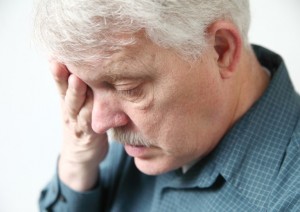Nonsurgical Treatment Brings New Hope to Trigeminal Neuralgia Sufferers
 Trigeminal neuralgia has been nicknamed the “suicide disease” because the pain it causes is said to be so bad that it drives sufferers to suicide. While there is a widespread myth about the number of people who commit suicide because of this disease, the pain of this condition can range from mild to excruciating and can be brought on by such innocuous stimuli as touching your face, eating, drinking, or talking.
Trigeminal neuralgia has been nicknamed the “suicide disease” because the pain it causes is said to be so bad that it drives sufferers to suicide. While there is a widespread myth about the number of people who commit suicide because of this disease, the pain of this condition can range from mild to excruciating and can be brought on by such innocuous stimuli as touching your face, eating, drinking, or talking.
While standard pain medications do little to mitigate trigeminal neuralgia pain, drugs like oxcarbazepine or balcofen may bring relief of symptoms. However, these drugs can lose their effectiveness. Surgical procedures are available for trigeminal neuralgia, but until recently, these were invasive. A study published in the Journal of NeuroInterventional Surgery showed that radio surgery with CyberKnife can relieve trigeminal neuralgia pain in most patients.
What Causes Trigeminal Neuralgia Pain?
Trigeminal neuralgia is most often described as a sharp, shooting, or electrical-shock-like pain that affects the cheek, teeth, jaw, gums, lips, eye, or forehead on one side of the face. Pain is usually brief in duration, lasting up to several seconds, but it’s recurrent, and can be brought on by speaking, chewing, brushing the teeth, or touching the face. Trigeminal neuralgia symptoms can recede for months or years and then return without warning.
The pain usually occurs due to pressure on the root of the trigeminal nerve, which serves the face and mouth. Such pressure usually comes from an artery or vein pressing on the root of the nerve, though a tumor may also be the culprit. Age is a risk factor for trigeminal neuralgia.
Treating Trigeminal Neuralgia
 While drugs can relieve the pain associated with trigeminal neuralgia, they can become less effective over time or cause side effects like confusion, dizziness, drowsiness, double vision, or nausea. A surgery known as microvascular decompression can be used to remove or relocate veins and arteries that may be compressing the root of the trigeminal nerve, but this procedure is invasive and may not be effective for all patients. Side effects can include double vision, weakness, or numbness in the face, impaired hearing, and even stroke.
While drugs can relieve the pain associated with trigeminal neuralgia, they can become less effective over time or cause side effects like confusion, dizziness, drowsiness, double vision, or nausea. A surgery known as microvascular decompression can be used to remove or relocate veins and arteries that may be compressing the root of the trigeminal nerve, but this procedure is invasive and may not be effective for all patients. Side effects can include double vision, weakness, or numbness in the face, impaired hearing, and even stroke.
Radio surgery has been used to treat trigeminal neuralgia for some time. It works by administering radiation to the trigeminal nerve to dull its pain response. Previous techniques required patients to have an invasive procedure that involved mounting a frame in the skull, but new CyberKnife technology enables patients to take advantage of image guidance and tracking software to benefit from radio surgery without the need for a frame. Now you can get relief from trigeminal neuralgia pain with a non-invasive, non-surgical outpatient procedure.
For the study published in the Journal of NeuroInterventional Surgery, researchers looked at the effects of CyberKnife radio surgery on 17 trigeminal neuralgia patients aged 36 to 90 who received surgery between 2007 and 2009. These patients had failed to respond to other treatments, and had suffered between one and 11 years.
Fourteen of the patients said they experienced partial or total relief of symptoms, and the average patient began to experience symptom relief in about two months. Four of the patients experienced symptom relapse three to 18 months later. None of the patients reported any serious side effects, and only two reported mild side effects.
If you or someone you love is suffering from trigeminal neuralgia pain, there’s no need to undergo an invasive surgical procedure. For many who try CyberKnife radio surgery, symptom relief is total and permanent.
More
5 Ways to Fight Cancer Fatigue
 Fatigue is a common side effect of cancer and its treatment. Cancer-related fatigue can be disabling, and can interfere with your daily life and with your ability to stick with radiation therapy or other cancer treatment. But you don’t have to let cancer fatigue put you out of commission.
Fatigue is a common side effect of cancer and its treatment. Cancer-related fatigue can be disabling, and can interfere with your daily life and with your ability to stick with radiation therapy or other cancer treatment. But you don’t have to let cancer fatigue put you out of commission.
If your cancer fatigue is interfering with your ability to work, exercise, eat, spend time with loved ones, or otherwise live your daily life, talk to your doctor. Your doctor may be able to treat causes of cancer fatigue like pain, sleeplessness, or hormonal changes. You also may be able to take medications to treat fatigue related to cancer treatment. You can try to keep your energy levels up by getting plenty of sleep, managing your activity levels, exercising, accepting help from others, and eating a healthy diet.
1. Get Plenty of Sleep
You may expect a lot of things from radiation therapy, but many people are surprised to find that they need a little more sleep during radiation therapy than they did before. Try to get at least eight hours of sleep a night, but don’t expect that to necessarily be enough to feel well-rested. Light activity during the day can help you sleep better at night, as well as help you maintain your energy levels throughout the day. Try to go for a walk, do some yoga, or perform other light physical exercise each day. Do something relaxing before bed, like listening to music, meditating, taking a hot bath, or reading a book.
2. Keep Your Activity Levels Reasonable
Cancer fatigue may mean that you’re no longer capable of doing as much as you did before the treatment. Now is the time to think about your priorities — what activities are most important to you? You may find that spending more time with your children or enjoying your favorite hobbies is more important than working a full schedule or doing some housework.
3. Exercise
If you were already active prior to your cancer diagnosis, you can fight fatigue by trying to stay as active as possible. If you weren’t very active, you can still start a new exercise routine, simply by adding some light exercise to your daily routine. Even 15 to 30 minutes of stretching or walking can boost your energy. Talk to your doctor about how to safely add exercise to your daily routine.
 4. Don’t Be Too Proud to Ask for Help
4. Don’t Be Too Proud to Ask for Help
Whether you’re able to accept help from a professional home health aide or you’ll be asking for help from friends and family, assistance can be invaluable when you’re struggling with cancer fatigue. Delegating tasks like cooking, cleaning, running errands, and driving can help you conserve energy levels for those things that are most important to you without sacrificing your quality of life.
5. Eat a Healthy Diet
It can be hard to maintain a healthy diet when shopping and cooking makes you tired. Nutritious, tasty recipes don’t have to be complicated or time-consuming to prepare. Make eating well a priority. A diet rich in fruits, vegetables, nuts, lean meat, low-fat dairy, and whole grains can be easy to enjoy.
It’s normal to feel fatigue during cancer treatment. Talk to your doctor about ways to treat your fatigue, and take steps to keep your energy and strength up. Once your cancer treatment is finished, you’ll soon find your former energy levels returning.
More
Can Positive Thinking Really Help You Beat Cancer?
 A cancer diagnosis can bring about a lot of difficult feelings. Once the initial shock wears off, anger, fear, sadness, anxiety, and even depression can set in. It’s easy to start feeling guilty — like many people who’ve been diagnosed with cancer, you might wonder if you’ve somehow brought the cancer on yourself through your lifestyle or actions. You might also wonder if you can help yourself recover from cancer by maintaining a positive attitude or joining a support group.
A cancer diagnosis can bring about a lot of difficult feelings. Once the initial shock wears off, anger, fear, sadness, anxiety, and even depression can set in. It’s easy to start feeling guilty — like many people who’ve been diagnosed with cancer, you might wonder if you’ve somehow brought the cancer on yourself through your lifestyle or actions. You might also wonder if you can help yourself recover from cancer by maintaining a positive attitude or joining a support group.
While some studies have seemed to show a link between an increased chance of cancer survival and certain personality traits, a positive attitude, or participation in a support group, most research does not. Even when a particular study seems to show that maintaining a positive attitude can help with cancer treatment, researchers can’t duplicate those results. So, while joining a support group or trying to stay positive can certainly make it easier to cope with cancer treatment, it’s not going to influence the success of your treatment in any meaningful way.
Emotions and Personality Don’t Influence Cancer Treatment
According to the American Cancer Society, it was once believed personality type was a risk factor in developing cancer. It was thought that those with introverted or neurotic personalities were more prone to cancer. It was perhaps a natural extension of this belief to feel that a cancer patient’s core personality traits influenced how successful cancer treatment might be. A 2010 study that followed 60,000 people for 30 years put this theory to rest. The researchers found no link between core personality traits and cancer risk or survival rates.
Still, many people continue to believe that your attitude or emotional state during cancer treatment can influence your chances of survival. A 2007 study of over 1,000 people being treated for head and neck cancer found that patients’ emotional state during cancer treatment did not influence their chances of treatment success. No amount of positive thinking or visualization can help your body fight cancer more effectively. It makes sense — if you could think your way out of having cancer, no one would ever need chemotherapy.
 A Positive Attitude Can Improve Quality of Life
A Positive Attitude Can Improve Quality of Life
That doesn’t mean there’s no value in making an effort to stay positive during cancer treatment in Los Angeles. Don’t beat yourself up if you find yourself struggling with difficult feelings in the wake of a cancer diagnosis — it’s normal to experience emotional side effects, and blaming yourself for feeling bad will only make you feel worse. If you’re struggling with fear, anger, depression, guilt, or other difficult feelings during cancer diagnosis, you may want to seek counseling or look into attending a support group.
Counseling and support groups can help you cope with fatigue, tension, and anxiety during cancer treatment, and can reduce your risk of depression. People who seek help to cope with cancer consistently report better quality of life than those who do not. Other ways to cope include doing your best to maintain a healthy lifestyle, spending time with family and friends, accepting help, making time for what’s really most important to you, and taking life one day at a time.
Despite popular belief, positive thinking can’t help you beat cancer. But it can help you maintain a normal, happy lifestyle throughout cancer treatment. Don’t be afraid to ask for help in coping with the emotional effects of cancer and its treatment. You’re not alone.
More
Hope Is the Key to Successful Cancer Treatment
 No matter where you are in cancer treatment or what your prognosis, hope is an important part of your treatment success. That doesn’t necessarily mean that you hope for a cure — although many people, especially among those whose cancer was diagnosed at an early stage, hope for exactly that. People who have survived cancer hope that their cancer won’t return. And even those for whom a cure isn’t likely have hope, too — they hope to spend time with loved ones and friends, go on an anticipated vacation, attend a school reunion, maintain their quality of life, and keep cancer from progressing.
No matter where you are in cancer treatment or what your prognosis, hope is an important part of your treatment success. That doesn’t necessarily mean that you hope for a cure — although many people, especially among those whose cancer was diagnosed at an early stage, hope for exactly that. People who have survived cancer hope that their cancer won’t return. And even those for whom a cure isn’t likely have hope, too — they hope to spend time with loved ones and friends, go on an anticipated vacation, attend a school reunion, maintain their quality of life, and keep cancer from progressing.
Why Hope Is Important
Having hope in the face of cancer treatment can help you feel better about where you are in life, but that’s not the only reason it’s important. Feelings of hope — whether they’re for a cure or for other realistic goals — can help you to better come to terms with your cancer diagnosis and what it means for your future, but they can also boost your overall pain tolerance and improve your quality of life. Cancer patients who are hopeful are more psychologically resilient, and benefit from better self-esteem.
Cultivating Hope During Cancer Treatment
You might think of hope as something that just happens to you, but in fact, hope is something you can nurture through your actions. Cultivating hope in the midst of adversity requires four steps:
- Sizing up the situation
- Thinking about it
- Making new goals
- Putting the situation in a new context
Cultivating hope isn’t just something you do by yourself, however. The others in your life can bolster — or tear down — your feelings of hope. Friends, loved ones, and members of your treatment team can help you stay hopeful during treatment. Reach out to coworkers, family members, friends, fellow worshippers at church, and members of your treatment team for support, encouragement, and compassion. It could make a big difference.
 Your sense of control over your illness and your own sense of determination to meet your personal goals can also influence your ability to feel hope. But without hope, you’ll suffer from feelings of emotional and psychological distress and fear; hopelessness could even cause your health to suffer and impair your cancer treatment.
Your sense of control over your illness and your own sense of determination to meet your personal goals can also influence your ability to feel hope. But without hope, you’ll suffer from feelings of emotional and psychological distress and fear; hopelessness could even cause your health to suffer and impair your cancer treatment.
If your cancer was diagnosed at an early stage and you hope for a cure, then reading testimonials from cancer survivors can help you nurture your feelings of hope. Even if your prognosis is less encouraging, you can begin to find hope by adapting to your diagnosis. Cancer is not your whole life; keep the bigger picture in mind. Focus on what’s important to you – family, traveling, or hobbies, for example. Doing your best to maintain a normal routine can help.
Many cancer patients maintain their sense of hope by avoiding any negative thoughts or information that could discourage them. Taking steps to actively avoid statistics about your specific type of cancer, or your prognosis, isn’t denial as long as you accept the reality of your diagnosis. Instead, it can be an important part of maintaining your sense of optimism and mental health.
While it might seem difficult to cultivate hope in the face of a cancer diagnosis, doing so can improve your treatment outcomes and your quality of life. Don’t let your cancer diagnosis distract you from the things that matter.
More
Don’t Let Depression Sabotage Your Breast Cancer Treatment
 Between 9 and 25 percent of women with breast cancer will also be diagnosed with depression. Even according to the most conservative estimates, women with breast cancer are twice as likely as the general population to be diagnosed with depression. And that’s a big deal, because depression is more than just an emotional phenomenon — it causes physiological symptoms that can make breast cancer harder to treat, and significantly raise your rate of recurrence.
Between 9 and 25 percent of women with breast cancer will also be diagnosed with depression. Even according to the most conservative estimates, women with breast cancer are twice as likely as the general population to be diagnosed with depression. And that’s a big deal, because depression is more than just an emotional phenomenon — it causes physiological symptoms that can make breast cancer harder to treat, and significantly raise your rate of recurrence.
It’s not unusual to experience feelings of depression following a breast cancer diagnosis. Being diagnosed with breast cancer fundamentally changes your life, and can force you to re-evaluate your priorities. If you’re diagnosed with breast cancer and experience feelings of depression, seeking treatment for your depression can be a matter of survival.
The Link Between Depression and Breast Cancer
The reason so many women with breast cancer are diagnosed with depression is because the two disorders are linked. While doctors don’t yet fully understand how one condition contributes to the other, they do know that cancer cells produce chemicals that can cause depression symptoms. Once depression sets in, it can promote the spread or recurrence of cancer. A depressed woman who does not have breast cancer is more likely than her non-depressed counterpart to be diagnosed with the disease. A woman with breast cancer who develops depression can experience a 25 to 35 percent increase in recurrence rates.
That’s because depression is, at its core, an inflammatory disease. It interferes with the immune system to cause breast cancer as well as other diseases. In a study performed at the University of Miami’s Miller School of Medicine, researchers discovered that women who have been successfully treated for breast cancer retain breast cancer cells within their bone marrow. A later illness, like depression, diabetes, or obesity, can cause those cells to activate.
Fighting Depression Caused by Breast Cancer
If you’re experience depression during breast cancer treatment, you need psychotherapy in order to combat it. Many women say they benefit the most from talk therapy, which can help them figure out how to best cope with their disease and care for themselves emotionally. Antidepressants are another option, and most doctors recommend regular exercise to help breast cancer patients fight depressed mood.
 Breast cancer treatment can affect your energy levels. When you get radiation treatment for breast cancer, or have surgery, it can leave your arms and chest feeling sore and stiff. Doctors recommend gentle exercise, like walking, to boost energy levels, combat fatigue, and stave off depression. Gentle activities that stretch and strengthen the arms, like yoga or tai chi, can also help boost mood, improve muscle tone, and support recovery.
Breast cancer treatment can affect your energy levels. When you get radiation treatment for breast cancer, or have surgery, it can leave your arms and chest feeling sore and stiff. Doctors recommend gentle exercise, like walking, to boost energy levels, combat fatigue, and stave off depression. Gentle activities that stretch and strengthen the arms, like yoga or tai chi, can also help boost mood, improve muscle tone, and support recovery.
You should try to get at least two hours of moderate exercise per week — two hours of brisk walking, for example, has been linked with a 40 percent reduction in risk of death among breast cancer patients and survivors. Don’t overdo it; excessive exercise during or immediately after cancer surgery or other treatment could impair your recovery. Avoid any activities that raise your body temperature, like hot yoga, since these could increase your risk of lymphedema.
Many women who are diagnosed with breast cancer also struggle with depression; if you’re one of them, get help. Not getting depression help could seriously impact the success of your breast cancer therapy, but getting depression treatment could promote your recovery and protect you from recurrence.
More
 Trigeminal neuralgia has been nicknamed the “suicide disease” because the pain it causes is said to be so bad that it drives sufferers to suicide. While there is a widespread myth about the number of people who commit suicide because of this disease, the pain of this condition can range from mild to excruciating and can be brought on by such innocuous stimuli as touching your face, eating, drinking, or talking.
Trigeminal neuralgia has been nicknamed the “suicide disease” because the pain it causes is said to be so bad that it drives sufferers to suicide. While there is a widespread myth about the number of people who commit suicide because of this disease, the pain of this condition can range from mild to excruciating and can be brought on by such innocuous stimuli as touching your face, eating, drinking, or talking. While drugs can relieve the pain associated with trigeminal neuralgia, they can become less effective over time or cause side effects like confusion, dizziness, drowsiness, double vision, or nausea. A surgery known as microvascular decompression can be used to remove or relocate veins and arteries that may be compressing the root of the trigeminal nerve, but this procedure is invasive and may not be effective for all patients. Side effects can include double vision, weakness, or numbness in the face, impaired hearing, and even stroke.
While drugs can relieve the pain associated with trigeminal neuralgia, they can become less effective over time or cause side effects like confusion, dizziness, drowsiness, double vision, or nausea. A surgery known as microvascular decompression can be used to remove or relocate veins and arteries that may be compressing the root of the trigeminal nerve, but this procedure is invasive and may not be effective for all patients. Side effects can include double vision, weakness, or numbness in the face, impaired hearing, and even stroke.







